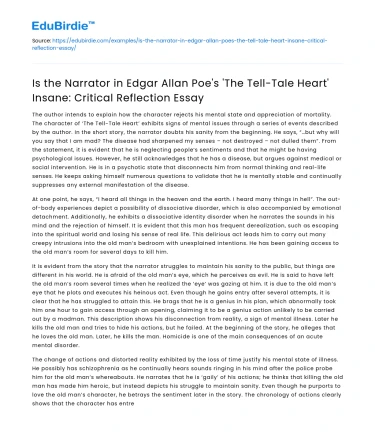The author intends to explain how the character rejects his mental state and appreciation of mortality. The character of ‘The Tell-Tale Heart’ exhibits signs of mental issues through a series of events described by the author. In the short story, the narrator doubts his sanity from the beginning. He says, “…but why will you say that I am mad? The disease had sharpened my senses – not destroyed – not dulled them”. From the statement, it is evident that he is neglecting people’s sentiments and that he might be having psychological issues. However, he still acknowledges that he has a disease, but argues against medical or social intervention. He is in a psychotic state that disconnects him from normal thinking and real-life senses. He keeps asking himself numerous questions to validate that he is mentally stable and continually suppresses any external manifestation of the disease.
At one point, he says, “I heard all things in the heaven and the earth. I heard many things in hell”. The out-of-body experiences depict a possibility of dissociative disorder, which is also accompanied by emotional detachment. Additionally, he exhibits a dissociative identity disorder when he narrates the sounds in his mind and the rejection of himself. It is evident that this man has frequent derealization, such as escaping into the spiritual world and losing his sense of real life. This delirious act leads him to carry out many creepy intrusions into the old man’s bedroom with unexplained intentions. He has been gaining access to the old man’s room for several days to kill him.
Save your time!
We can take care of your essay
- Proper editing and formatting
- Free revision, title page, and bibliography
- Flexible prices and money-back guarantee
It is evident from the story that the narrator struggles to maintain his sanity to the public, but things are different in his world. He is afraid of the old man’s eye, which he perceives as evil. He is said to have left the old man’s room several times when he realized the ‘eye’ was gazing at him. It is due to the old man’s eye that he plots and executes his heinous act. Even though he gains entry after several attempts, it is clear that he has struggled to attain this. He brags that he is a genius in his plan, which abnormally took him one hour to gain access through an opening, claiming it to be a genius action unlikely to be carried out by a madman. This description shows his disconnection from reality, a sign of mental illness. Later he kills the old man and tries to hide his actions, but he failed. At the beginning of the story, he alleges that he loves the old man. Later, he kills the man. Homicide is one of the main consequences of an acute mental disorder.
The change of actions and distorted reality exhibited by the loss of time justify his mental state of illness. He possibly has schizophrenia as he continually hears sounds ringing in his mind after the police probe him for the old man’s whereabouts. He narrates that he is ‘gaily’ of his actions; he thinks that killing the old man has made him heroic, but instead depicts his struggle to maintain sanity. Even though he purports to love the old man’s character, he betrays the sentiment later in the story. The chronology of actions clearly shows that the character has entrenched mental issues, dissociating him from emotional consciousness. Even as the old man suffers before death, he can be seen celebrating his actions, the proof is his mental instability. He purports that the sounds of the old man’s ‘heartbeat’ sold him out to the police. He concludes by insulting the police officers, “‘Villains!’... ‘here! It is the beating of his hideous heart!’”. He rejects the love for the old man and portrays him as having an unpleasant heart.
Thus, it is clear that the narrator is experiencing unnatural events and his act of murder justifies the need for clinical intervention in the state he rejects.
Work Cited
- Poe, Edgar Allan, and Wolfgang Buchta. The Tell-Tale Heart. Wolfgang Buchta, 2002.






 Stuck on your essay?
Stuck on your essay?

